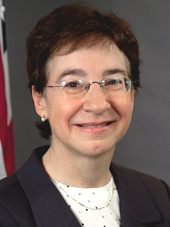SEC Charges Dallas-Based Hedge Fund Adviser for Participating in Stock Offerings After Selling Short
FOR IMMEDIATE RELEASE
2010-172
High-Res Photo

“Investment advisers must recognize that combined trading by different portfolio managers can still constitute a clear violation of Rule 105 when short selling takes place during a restricted period.”
Antonia Chion
Associate Director
SEC Enforcement Division
Washington, D.C., Sept. 23, 2010 — The Securities and Exchange Commission today charged Dallas-based hedge fund adviser Carlson Capital, L.P. with improperly participating in four public stock offerings after selling short those same stocks.
Carlson agreed to pay more than $2.6 million to settle the SEC's charges.
The SEC's Rule 105 of Regulation M helps prevent short selling that can reduce proceeds received by companies and shareholders by artificially depressing the market price shortly before the company prices its public offering. Rule 105 ensures that offering prices are set by natural forces of supply and demand rather than manipulative activity by prohibiting the short sale of an equity security during a restricted period — generally five business days before a public offering — and the purchase of that same security through the offering. The rule applies regardless of the trader's intent in selling short the stock.
According to the SEC's order, Carlson violated Rule 105 on four occasions and had policies and procedures that were insufficient to prevent the firm from participating in the relevant offerings. For one of those occasions, the SEC found a Rule 105 violation even though the portfolio manager who sold short the stock and the portfolio manager who bought the offering shares were different.
"Investment advisers must recognize that combined trading by different portfolio managers can still constitute a clear violation of Rule 105 when short selling takes place during a restricted period," said Antonia Chion, Associate Director of the SEC's Division of Enforcement. "This is true even when the portfolio managers have different investment approaches and generally make their own trading decisions."
In its order, the SEC found that the "separate accounts" exception to Rule 105 did not apply to Carlson's participation in that offering. If certain conditions are met, this exception allows the purchase of an offered security in an account that is "separate" from the account through which the same security was sold short. The Commission found that the combined activities of Carlson's portfolio managers violated Rule 105 and did not qualify for the separate accounts exception because the firm's portfolio managers:
- Could access each others' trading positions and trade reports, and could consult with each other about companies of interest.
- Reported to a single chief investment officer who supervised the firm's portfolios and had authority over the firm's positions.
- Were not prohibited from coordinating with each other with respect to trading.
The SEC further found that the portfolio manager who sold short the particular stock during the restricted period received information — before the short sales were made — that indicated the other portfolio manager intended to buy offering shares.
Without admitting or denying the SEC's findings, Carlson agreed to pay a total of $2,653,234, which includes $2,256,386 in disgorgement of improper gains or avoided losses, a $260,000 penalty, and pre-judgment interest of $136,848. Carlson also consented to an order that imposes a censure and requires the firm to cease and desist from committing or causing any violations and any future violations of Rule 105. During the SEC's investigation, the adviser took remedial measures including implementation of an automated system that helps review the firm's prior short sales before it participates in offerings.
This case was investigated by David Mendel and Robert Cohen in the SEC's Division of Enforcement. The Commission acknowledges the assistance of NYSE Regulation in this matter.
# # #
For more information about this enforcement action, contact:
Antonia Chion
Associate Director, SEC Division of Enforcement
(202) 551-4842
Robert A. Cohen
Assistant Director, SEC Division of Enforcement
(202) 551-4869
http://www.sec.gov/news/press/2010/2010-172.htm
|

